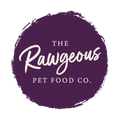The Best Dog Allergy Food is Raw
Why raw food is the best option for dogs with allergies: An Introduction
Raw dog food is the best choice for dogs with allergies because it eliminates common allergens found in processed foods, such as grains and fillers.

Natural dog food: A taste of the Wild
Additionally, a raw dog food diet most closely mimics a dog's natural eating habits and can improve overall health and digestion.
Furthermore, switching to a raw diet can often lead to a significant reduction or even elimination of allergy symptoms.
As always, it is important to consult with a veterinarian before making any changes to your dog's diet. However, for dogs suffering from allergies, a raw dog food diet may be the best solution.
The benefits of a raw diet for overall health and well-being
Switching to Raw
Switching to a raw diet for your dog can additionally have numerous benefits for their overall health and well-being. This type of diet, consisting of raw meat, bones, fruits, and vegetables, closely mimics what dogs would naturally eat in the wild.
Eliminating Triggers
Not only does this type of food eliminate common allergy triggers like grains and fillers, it also provides all-natural, highly nutritious ingredients.
Eating a grain free, hypoallergenic dog food diet can improve digestion and nutrient absorption, leading to a shiny coat and healthy skin. The best dog foods can also improve dental health, as chewing on raw bones can help keep teeth clean, whereas dry dog food can clog teeth and cause bad breath.
Improving Digestion
Commercial dog foods contain fillers and additives that can be difficult for dogs to digest, especially dogs with food sensitivities.
Even 'healthy' commercial products are not always very 'natural' for dogs. As an example dog food containing rice formula will only be appropriate for dogs without a grain allergy, and it is still not even close to the diet a dog would eat in the wild.
A grain-free raw diet with a natural balance of healthy ingredients is gentle on the digestion and because it contains only natural foods, you eliminate potential irritants, promote a stronger immune system and support overall vitality, all of which will be reflected in your dog's skin and coat, it's teeth and temperament.
For dogs with food allergies, and for puppies you can go one step further and choose a single protein meal to avoid, or test for and eliminate possible food allergens, but more on that later.
Common Types of Allergies in Dogs
Environmental Allergens for Dogs
Common allergies in dogs include environmental allergens such as pollen, mould, and dust mites. These can cause skin allergies and affect dogs respiratory system.

Pollen as a common allergen
Pollen is a common allergen for both humans and dogs, can be difficult to avoid at certain times of year. However, giving your dog regular baths and keeping their living area clean can help promote a healthy environment and reduce exposure to pollen and minimise symptoms in dogs with allergies.

Mould as a Trigger for Skin Allergies in Dogs
Mould can be found in damp areas such as a basement or bathroom, and can be a real problem for dogs with allergies causing nasty reactions.
Keeping your home clean and dry, particularly in humid environments, can help reduce exposure to mould allergens and reduce flare ups for dogs with skin allergies.

Dust Mites as a cause of Skin Allergies
Dust mites are microscopic insects that are often found in household dust. These tiny creatures are key culprits of skin allergies in dogs, leading to symptoms such as itchy skin and respiratory issues.
Regular vacuuming and dusting can help reduce dust mite exposure and alleviate symptoms for dogs with allergies.
Seasonal Airborne Allergies in Dogs

Atopy Explained
Seasonal allergies in dogs, also known as atopy, can cause symptoms such as itching and skin irritation. These types of allergies are often airborne allergens, linked to certain plants or trees, such as grasses and weeds.

Grasses and Weeds
These can be particularly problematic for dogs with allergies, as they are often found in outdoor areas where dogs spend time playing or exercising.
Keeping your dog away from heavily grassy areas can help reduce their exposure to these allergens and minimise symptoms.
Switching to a raw dog food diet can also help reduce the symptoms of seasonal allergies by eliminating potential triggers found in processed foods.

The power of Supplements for Helping Dogs with Allergies
Additionally, adding certain supplements, such as fish oil and coconut oil, to a raw diet can help improve the symptoms of atopy. It is important to consult with a veterinarian for proper diagnosis and treatment of seasonal allergies in dogs.
Contact Allergens
Contact allergens can cause extreme skin irritation and discomfort for dogs. These commonly include ingredients in grooming products, such as shampoos or conditioners, as well as materials found in bedding or certain fabrics such as wool.
It is important to pay attention to the ingredients in grooming products and choose ones made with natural, hypoallergenic ingredients.
Additionally, using a hypoallergenic bedding material can also help reduce discomfort for dogs with contact allergies.
Food Allergens and Dogs

Dogs can develop food allergies at all life stages, with the most common triggers being beef, chicken, dairy, corn, wheat, soy and egg.
A significant proportion of dogs, much like humans, are being identified as having a grain allergy and therefore need grain free food.
Food allergies in dogs are less common than environmental or contact allergies, and can often go undiagnosed because they can present with similar symptoms to environmental allergies, such as irritated or itchy skin.
Unlikely suspects for Food Allergies:

Feeding dogs brown rice
It is important to note that brown rice can also be a common allergen for dogs.
There is a common misconception that rice is a safe food option for dogs with allergies, but it can actually be just as allergenic as other grains like wheat or corn.

Rice and Potato as Ingredients in Dog Foods
While you can find rice formula and potato formula available to buy online, and brown rice may provide some health benefits such as fibre, vitamins and minerals, if your dog has a known grain allergy it is definitely best to avoid feeding them brown rice in their food.
Ideally we would advise avoiding potato formula and sticking to grain free food for dogs to avoid any potential reaction to food allergens.

Sweet potatoes in Dog Foods
There is no evidence to suggest that sweet potato can cause allergies in dogs. In fact, sweet potatoes can be a nutritious addition to your dog food diet, in moderation.
However, even the tastiest sweet potato recipe must be cooked thoroughly before being fed to your dog and never fed in excess as it can potentially cause a stomach upset particularly for a dog with a sensitive stomach.
Toxins in Raw Sweet Potatoes and Potatoes
You should never feed your dog raw sweet potatoes as a sweet potato actually contains a compound that can be toxic to dogs. The same is true for potatoes, which is why the potato in dog food that contains potato formula will be cooked.
Overall, however sweet potatoes can make a tasty and healthy vegetable treat for your furry friend, as long as they are fed in moderation and properly prepared. Try adding a cooked sweet potato to a high quality protein source for a yummy, safe grain free food.
Skin Allergies in Dogs
Skin allergies in dogs, also known as allergic dermatitis, can be caused by different types of allergens including: contact allergens, food allergies or other environmental factors and can cause symptoms such as redness, irritation and itchy skin.
Common triggers for these types of allergies include flea bites, as well as shampoos or grooming products, as well as certain foods including dry dog food.
Parasites
Parasites, such as fleas and ticks, can trigger an allergic reaction in dogs.
These parasites can cause intensely itchy skin and irritation, leading to inflammation and discomfort for your dog which may display erratic behaviour as it is attacked by biting fleas.
Regularly treating your dog for parasites and keeping them free of fleas and ticks can help alleviate symptoms associated with these allergies.
Additionally, switching to a grain free, raw diet can reduce the likelihood of parasitic allergies.
It is however always important to consult with a veterinarian for proper diagnosis and treatment of parasitic allergies in dogs.

Grain Free, Hypoallergenic Dog Food can alleviate skin allergies
We have found that one way to help alleviate symptoms of skin allergies is to switch to a grain free, hypoallergenic dog food diet, which eliminates potential triggers found in processed dog foods.

Natural Grooming Products for Dog Skin and Coat
Additionally, alongside hypoallergenic dog food, the use of natural grooming products and proper flea prevention can also help improve symptoms of allergic dermatitis and skin allergies.
Allergies: A Range of Symptoms
An unbalanced digestive system in dogs with food allergies, or skin allergies, and or dogs with sensitive skin and stomach can all produce a variety of symptoms ranging from the severe to the mundane.
The Most Commonly Recognised Symptoms in dogs
The most common signs are excessive itching or scratching, as irritation caused by itchy skin can drive your dog crazy, and they may develop rashes, as well as typical physical symptoms with food allergies such as vomiting and diarrhoea.
Checklist of common signs and symptoms of dogs with allergies:
-
Coughing
-
Sneezing
-
Wheezing
-
Difficulty Breathing
-
Red, watery eyes
-
Red or Itchy skin
-
Sore ears
-
Skin Rashes
-
Sickness
-
Diarrhoea
-
Erratic behaviour
-
Change in behaviour / temperament

Less Common Signs of Allergies
We may automatically look for signs in the skin and coat of a dog with food sensitivities or recognise that a sensitive stomach denotes a food allergy, but we wouldn't necessarily know that if your dog is more prone to ear infections that, that can be a potential symptom of a food allergy!
Some counter intuitive symptoms of food allergies in dogs might include respiratory issues, such as sneezing or coughing, whilst many chronic allergies can cause digestive issues such as gas or chronic inflammation (although these can also be caused by excessive consumption of dry dog food).
Monitor Your Dog
It is important to monitor your dog for any changes in behaviour or physical symptoms that may indicate an allergic reaction.
If you suspect your dog may have allergies, it is important to consult with a veterinarian for proper diagnosis and treatment.
Switching to a hypoallergenic diet or implementing an allergy-specific medication plan, or choosing a limited ingredient dog food for a period of time can often greatly improve your dog's symptoms and overall well-being.
Why Food allergens are often Hidden
We have mentioned common allergens found in processed dog food such as dairy, corn, wheat, soy, and beef but it's important to realise that these ingredients can often go unnoticed because they can be hidden in obscure labelling.
Carbohydrates and chemicals are commonly used as fillers, binders or preservatives both in dry dog food (kibble) as well as being present in wet dog food. You need to read the food label very carefully.
Even where labels are clear, grain based or grain free dry dog food isn't recommended amongst the best dog foods as your dogs really need a natural, raw diet full of animal protein, omega fatty acids, vegetables, vitamins and minerals to promote a healthy gut and healthy skin.
Your dog's stomach is essentially still that of a wild dog. Much like for a human, the more processed the product, the harder it is for the body to extract nutrients.
We know we are rather banging the drum for high quality raw dog food but...

Raw Dog Food is the Best Dog Food!
Switching to raw dog food with high quality animal protein, vitamins and minerals and omega 3, alongside omega 6 fatty acids can help eliminate potential triggers and simultaneously removes unhealthy ingredients such as fillers. A clean, healthy, grain free diet should improve symptoms.
Our Advice on Transitioning: Take it Slow
We recommend introducing new dog foods to your dog's diet slowly and in small quantities. This is particularly important for dogs with allergies as it can avoid causing a nasty allergic reaction.
How to Transition your Dog to Raw if it has Allergies
If your dog has allergies, it is important to consult with a veterinarian before making any dietary changes.
Your vet can help you with the best approach for transitioning to raw food, and can also advise on potential allergen triggers to watch out for in different types of raw foods.
Some tips for transitioning to a raw diet include gradually introducing new proteins and mixing them with your dog's current food, keeping an eye for any potential allergic reactions, before fully switching.
Choose your raw dog food brand wisely, looking for high quality ingredients, with clear information on where they are sourced, and ensure that the raw diet is balanced and complete.
Whilst we advocate for a raw diet as the best dog food option, it is important to note that every dog has unique nutritional needs and requirements.
A Limited Ingredient Diet: Testing for Allergies
One way to test for food sensitivities and prevent an allergic reaction is to introduce a limited ingredient dog food.
We would always recommend choosing a dog food that is grain free and high in animal protein, but serving up single proteins can help you work out any food allergies quickly, without having to pay for an expensive prescription diet.

Single Proteins:
Limited ingredient dog food will typically include only one animal protein source and or may have a single carbohydrate source, such as a lamb meal and sweet potato recipe.
This can be helpful in identifying specific triggers in your dog's diet as well as reducing symptoms in dogs with food sensitivities.
Single protein dog food can also be the best dog food for puppies or a dog with sensitive skin and stomach issues.

Single Proteins can be the Best Dog Food for Puppies
It is important to consult with a veterinarian and consider the individual needs and sensitivities of your puppy before choosing a protein source.
However, we recommend beef as a good choice for puppies because it is easily digestible and often well-tolerated by puppies with sensitive stomachs, particularly very young pups.
Beef is a good source of important nutrients for growth and development but not as rich as a lamb meal. Perhaps avoid rich foods such as labels advertising real salmon for example, this may be too much for a little tummy.
Puppies will benefit from a limited ingredient diet as they are more prone to developing food allergies, so starting them off with single protein dog food can help prevent sensitivities and reactions later in life.
Veterinary Recommendations: Nutro Limited Ingredient Diet for severe health conditions:
A vet may recommend a nutro limited ingredient diet if your dog has a severe health condition. They will probably also suggest supplements and medications.
Hypoallergenic Dog Food and Limited Ingredient Diet Foods on the Market
There are many options advertising a limited ingredient formula on the market including: Wellness Simple Limited Ingredient, Royal Canin Veterinary diet, Blue Buffalo basics, The Hill's science diet, Canidae Grain Free Pure, Merrick limited ingredient diet. The list of options is endless!

Grain Free Dry Dog Food
There are also many grain free dry dog food options, and almost every limited ingredient diet dog food brand will state it is the best dog food, designed to be gentle on the digestive system, better for dogs immune system, great for a dog with sensitive skin, ideal for sensitive stomachs and better than commercial dry dog food.
So where do you start with limited ingredient diets?
Tips for finding high-quality, allergen-free raw dog food
Top tip for finding high-quality, allergen-free raw dog food is to read the label to make sure the product lists an animal protein source as its main ingredient and contains omega fatty acids.
A grain free dog is a happy one because it's dog food provides natural balance!

Omega 3 and 6 Fatty acids
Other key ingredients to look for are healthy omega 6 fatty acids, omega 3 fatty acids and oils, fruits and vegetables, and all the essential vitamins and minerals your dog needs for a strong immune system.
Why are Omega Fatty Acids Important for your Dog?
To recap: Omega fatty acids are essential ingredients in high quality food for dogs of at life stages, from puppies to adult dogs because alongside essential vitamins, minerals and proteins they contribute to healthy skin, and a glossy coat. Omega 3 and 6 are known to help a dog's skin by reducing inflammation, and promoting overall health.
Dogs with allergies may benefit particularly from higher levels of omega 3 fatty acids in their diet as they have anti-inflammatory properties and can help reduce allergic reactions or symptoms in your dog.
Additionally, these essential fatty acids can also improve immune function and promote a healthy heart.
Dogs on a prescription diet, including a grain free diet are often also proscribed these fatty acid supplements.
Best Dog Food Brands
Another tip is to look for a raw dog food brand that offers limited ingredient diets, and rotational diets, which can help eliminate potential allergens and provide variety in your dog food not only at different times of the year, but also at different life stages.
The best dog food is the one that adapts to you and your dog.
Transparency and Clarity
Finally, look for a dog food brand that offers transparency and clarity not only on all ingredients from it's omega fatty acids, meat, vitamins minerals and additives, but also to where the food is sourced from.
It is important to also seek information on the manufacturing processes and testing protocols involved in the creation of your dog food. The best dog foods will provide this information on their website.

Rawgeous: The Best Dog Food for Dogs With Allergies

As it's done in the Wild
We think that Rawgeous is the best dog food for puppies and adult dogs.
Made with premium quality prime cuts of meat, our grain free, hypoallergenic dog food contains omega oils, animal protein, and essential vitamins and minerals.
The perfect grain free food for dogs with allergies at all life stages.
Rawgeous: The best dog food for Skin Allergies, Sensitive Skin and Stomach
We feel that Rawgeous is undoubtedly the best dog food for dogs with skin issues or compromised immune systems.
Our customers have reported the benefits of switching from commercial dog foods to grain free, hypoallergenic dog food after just 3 months.
Rawgeous: Hypoallergenic Dog Food and Single Proteins
Hopefully you'll find that your dog doesn't need to go on a prescription diet, or a nutro limited ingredient diet, however alongside Rawgeous' complete meals packed with fresh vegetables and omega oils, Rawgeous also has a variety of single protein options in it's wet dog food range.

Rawgeous Single Protein:
Our single protein boxes and sausages are not only perfect for dogs with allergies, both skin allergies or a food allergy. They are ideal for dogs with sensitive stomachs or perhaps just dogs that are a bit fussy.
Our single protein meals and sausages are also great for puppies as they're gentle on the tummy as well as being ideal for older adult dogs. So single Proteins offer every dog a safe taste of the wild.
Consult The Experts
If your dog has severe allergies, is unwell or has a very sensitive stomach, we would only encourage you to consult your vet before switching to a raw dog food diet.
We have seen that a grain free dog is happier, healthier and full of energy, but remember some dogs need a special prescription diet or supplements in their food and you should always ensure your vet is happy.
Dog Nutritionists recommendations:
Dog nutritionists generally agree that a properly balanced raw diet can be very beneficial for dogs.
It mirrors their ancestral diet and can provide high quality, nutrient-rich ingredients.
However, they also caution that it must be done carefully to ensure all necessary nutrients are being provided and to prevent potential contamination or food safety issues. They also emphasize the importance of consulting with a veterinarian or canine nutritionist before making any major diet changes.
Our Dog Nutritionist:
For more reassurance on the quality of Rawgeous you can hear what our Dog Nutritionist says about our premium raw food for dogs here.
Disclaimer:
Any mention of any other dog products or brands, including: Wellness Simple Limited Ingredient, Royal Canin Veterinary diet, Blue Buffalo basics, The Hill's science diet, Canidae Grain Free Pure, Merrick limited ingredient diet is purely illustrative, and should not be taken as a recommendation either for or against these alternative dog food producers.



